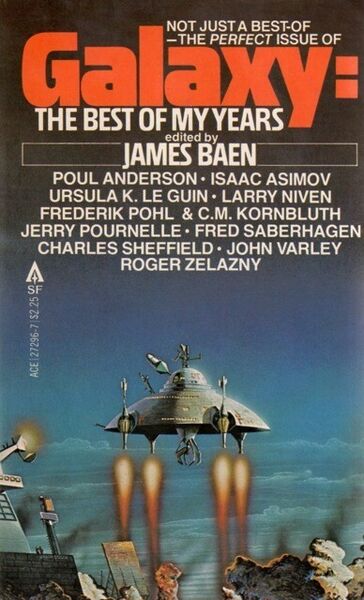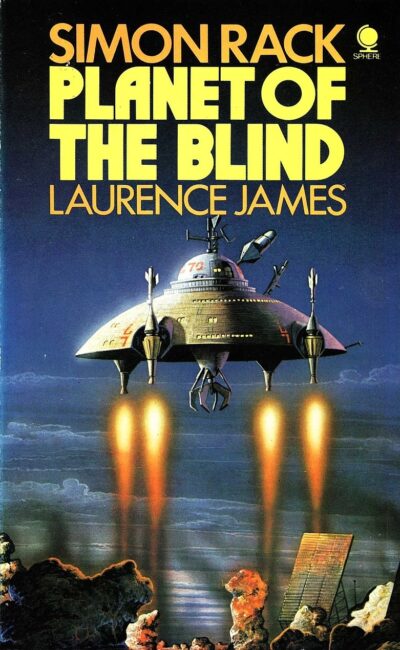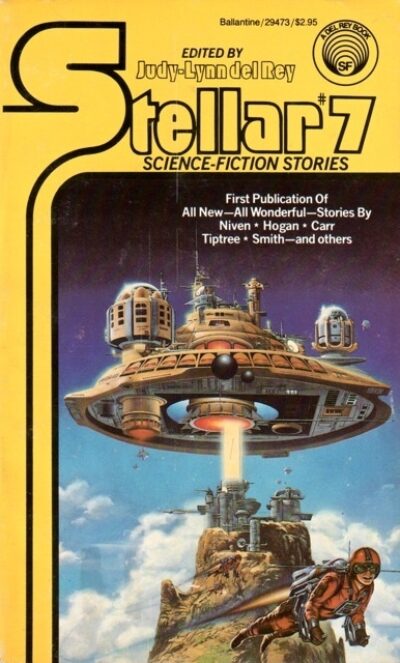One Grey Night
Galaxy: The Best of My Years
By Jim Baen

17 Aug, 2025
Jim Baen’s 1980 Galaxy: The Best of My Years selects the best pieces from Jim Baen’s 1974 to 1977 run as editor of Galaxy Magazine. Or rather, as Baen puts it, Baen’s version of a single perfect issue.
As Baen was no doubt aware, although he does not note it in the text, this science fiction anthology was also a requiem.
But first! Two digressions: that cover may look familiar. That is because a version was used on 1975’s Planet of the Blind.

It is also thematically related to David Mattingly’s cover for Stellar 7.

It’s interesting to watch the evolution of Baen’s preferred credit. He starts off as James Baen or sometimes James P. Baen, adopts the more formal James Patrick Baen in 1977, which he sticks with for some time (excepting for this anthology and The Best of Destinies, also 1980). In 1982, he uses Jim Baen as the byline for his first novel, The Taking of Satcon Station. With 1985’s Far Frontiers, he is simply Jim Baen.
As noted in a previous review, Galaxy Magazine had ten issues in 1977 (Baen’s last year as editor), seven issues in 1978, three issues in 1979, and one final issue in 1980… an issue that had not appeared by the time this anthology appeared1. The writing was very clearly on the wall, and had been for some time2. Indeed, Galaxy: The Best of My Years was not the only requiem Galaxy received in 1980. It’s just the one that was short enough that I could read it in the time available.
While it might seem a bit egotistical for Baen to showcase his own tenure as editor, other editors had done much the same3. As well, he was probably aware that another team was working on a longer-term retrospective. As well, Baen’s turn as Galaxy editor was very well received, enough to earn him a recurring spot as a Best Editor finalist4. If only fan adulation had translated to sales!
Teen me got burned by my own reading habits. I had tracked down all of Baen’s Galaxy back issues. As well, almost all of the contents had previously appeared in other anthologies and collections, which I owned, the primary exception being the Saberhagen story. This collection trod ground very familiar to me.
If someone weren’t already an avid Galaxy or Baen reader, this would have been an excellent introduction. Too bad that by the time the book appeared, Galaxy was functionally dead. Too bad for modern readers that Galaxy: The Best of My Years is out of print.
Let’s look inside.
The Myth of the Light-Barrier • [Editor’s Page (Galaxy)] • essay by Jim Baen
Relativity means the galaxy is smaller than it appears!
Provided one has a spaceship that can accelerate indefinitely, which means Baen’s point is factually correct while also being completely irrelevant to anything we will see in our lifetimes.
As I recall, Heinlein made a very similar point about the awesomeness of super-duper-rockets of the sort we have no idea how to make.
Is There Hope for the Future? • [Forum (Galaxy)] • (1974) • essay by Isaac Asimov
No. Possibly, if humans can eliminate unchecked population growth, nationalism, racism, sexism, and embrace the endless frontier of space.
Asimov makes it clear he didn’t have much faith people would do any of that. There’s a darkly amusing moment in his discussion of racism, specifically the justification by some that mistreating certain ethnic groups is OK if that group tends to have lower IQs. Asimov observes that he can think of at least one ethnic group who were persecuted for being too smart. Clearly, there’s a Goldilocks’ IQ at work here.
Yes, Asimov decried sexism and groped women. Humans.
“The Day Before the Revolution” • [Hainish] • (1974) • short story by Ursula K. Le Guin
As the Revolution looms, a visionary reflects on life.
Wait, asks a reader only familiar with later Baen Books output, Baen published Le Guin? Was this perhaps a different author who was also named Ursula K. Le Guin, a completely different Le Guin who would later go on to write a sixteen-volume series about why space lizards mean genocide is OK? Nope! This is the Ursula Le Guin, and this is a prequel to The Dispossessed. Young Baen cast his net a bit wider than Old Baen.
At some point, I need to review Russ’ Zanzibar Cat, also from Baen.
Our Many Roads to the Stars • (1975) • essay by Poul Anderson
Anderson outlines increasingly implausible means by which the stars might be reached.
The Gift of Garigolli • (1974) • novelette by C. M. Kornbluth and Frederik Pohl
Alien intervention saves a couple from crippling medical debt.
I will arbitrarily blame the long-dead-by-this-point Kornbluth for the violent misogyny with which this story is imbued.
Birthdays • (1976) • novella by Fred Saberhagen
A young boy wakes from hibernation one day per year. His companions do not hibernate. Thus, from his perspective the companions age in fast-forward.
This is reminiscent of Hogan’s 1980 Silver Shoes for a Princess or rather, given publication dates, the other way around. Both were bought by Baen. Both are contrived, too long, and were the duds of their respective issues.
Overdrawn at the Memory Bank • [Eight Worlds] • (1976) • novelette by John Varley
A vacationer struggles to withstand unexpected side-effects of his holiday.
This was later adapted to a film starting Raul Julia. If you enjoy Varley’s fiction or Raul Julia’s acting, avoid the film.
The Long Chance • (1977) • novelette by Charles Sheffield
A desperate widower is willing to go to any extreme to save his dead bride.
Almost any extreme. It’s clear he didn’t consider that perhaps his circumstances paralleled those of a famous Greek myth, a myth from which he could take a valuable lesson. Nor did he read the cryogenic storage manual.
Down and Out • [State] • (1976) • novelette by Larry Niven
A resurrected American struggles with the exceedingly uncooperative AI controlling the starship that the American is doing his best to steal.
This formed the middle section of A World Out of Time. It has the perhaps unintentional moral that one should not necessarily take at face value the confident proclamations about history from someone with no particular expertise in history.
That Buck Rogers Stuff • [A Step Farther Out] • (1976) • essay by Jerry Pournelle
Space will save us all.
“The Game of Blood and Dust” • (1975) • short story by Roger Zelazny
Two immortals play games with human destiny.
Galaxy and the Galaxy • (1977) • essay by Jim Baen
SF isn’t doomed… if it can just embrace all the wonderful possibilities in front of it.
A cynic might say the difference between Young Baen and Old Baen is that either he stopped believing this (and stopped publishing authors like Scott, Russ, and Malzberg) or that he decided commercial success required narrow focus on a very specific brand.
1: As I recall, a bid by Charles C. Ryan to save Galaxy managed to take down Ryan’s Galileo as well.
2: USA delenda est.
3: See Campbell’s Analog anthologies.
4: As long as Baen was editing Galaxy and Destinies, he landed on the Hugo shortlist. As soon as he focused on his publishing company, fannish recognition ceased for about a quarter of a century, until his death prompted his fans to nominate him. My objection to that back in 2007 wasn’t that he should not have been a finalist per se, just that the Best Dead Editor Hugo has an unpleasant history and fans should have nominated him when he was alive to appreciate it.
